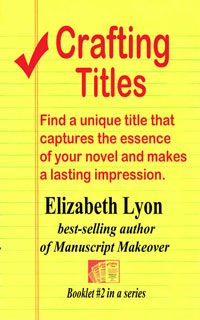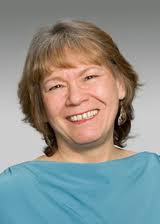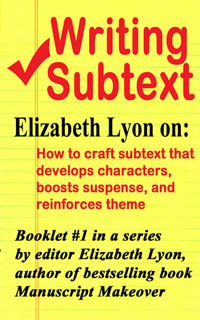Carolyn J. Rose Interviews Elizabeth Lyon
I will move mountains and earth–or at least share a post in the last few days before I leave on book tour–to have Elizabeth Lyon on my blog. Elizabeth’s book, The Sell Your Novel Toolkit, was instrumental in my learning how to write a query, a synopsis, and land an agent lo those many years ago. I recommend it at every workshop I give. Elizabeth has a way of drilling down to the core of what a writer needs to do and elucidating things, and she does the same in her latest release, which will help writers come up with a title for their books. Why are titles important? Well, they may compel an agent to take a second look at a query, an editor at a submission, or a reader a book on a shelf. But Elizabeth can tell you better than I! Here she is interviewed by indie mystery writer and friend, Carolyn Rose.
Mystery writer Carolyn J. Rose took a writing course from Elizabeth 25 years ago and they’ve been friends ever since. Carolyn recently interviewed Elizabeth about her second booklet, Crafting Titles.
What made you decide to write Crafting Titles?
My editing clients, friends, and even published novelists I know often choose ineffective titles and they don’t know how to find good ones.
Besides just putting in the research and seat time, what was the biggest challenge in writing the booklet?
I had to take into account all types of stories across all genres, and explain why a writer should choose a character name, a place, a snippet from the story, an image, or another combination for his or her title. Including all literature, present, past, and future was overwhelming.
Why is finding “the right title” so important?
A great title grabs reader attention. A weak title invites dismissal without a second look. Every novel can have many good titles, but the best ones capture the essence of a novel and give a tip-off to the genre. A title is a beacon drawing its ideal reader.
Can you give us some examples of authors who considered a title that would not have been as powerful as the one they went with and explain why the final choice was the best?
Mistress Mary is a strong character, but The Secret Garden is a place of transformation, discovery, and magic, a place where new life begins. “Secrets” entice readers to find out what they are. The Dead Undead is confusing; Dracula is singular force, the prime mover of the story, and a unique name that makes the tongue curl.
What are some classic titles that stand out for you as really doing the job? And what are some you feel fell short of the mark?
This is a trick question, right? We’ve practiced the titles of classics so many times, no other title sounds right. War and Peace is blah, a placeholder lacking imagination. Yet Tolstoy’s working title, The Year 1805, is worse. Perhaps for the same reason, I don’t like Cormac McCarthy’s title The Road. But then, it is as bland as the novel is bleak. You’d think that I’d like Gone with the Wind. I understand the symbolism, but if Mitchell wrote her novel in 2015, I think the better title would be Scarlett.
Classic titles that do the job? Mark Twain’s The Prince and the Pauper for the theme of social class conflict and the pleasant alliteration. Ray Bradbury’s Something Wicked This Way Comes for a poetic line from Macbeth that totally describes the evil that invades a little town. The Heart is a Lonely Hunter by Carson McCullers reaches inside me and makes my heart ache. Heller’s Catch-22 because it transcended the novel to enter our language as a problem with no good solution, a damned if you do, damned if you don’t.
How might genre or the audience you’re aiming at affect your choice of a title?
Most titles have keywords that are Morse code to the reader, and often signal an emotion common to the genre. For instance, Sweet Kisses is going to be a romance, possibly Y/A, with no sex. Kiss the Girls and Make Them Cry is a thriller. The Autumn of Sweet Kisses is likely mainstream or historical women’s fiction. Changing the title channel, The Last Mortician is not a book I would read at bedtime, nor is Bad Blood Brother.
If you had to choose between two titles, how would you do it?
Assuming I’ve gone through the process of elimination in Crafting Titles and narrowed my list of contenders down to two, I’d choose the one that packs the most emotion and creates the most curiosity.
What aspect of novel craft will you tackle for your next booklet?
Before I make a decision, I’d like to hear from writers regarding the aspects of craft they’d like to learn more about and why. Imagery? Plotting? Point of View? Characterization? Something else?
I hope Jenny and those who read her blog will share their views and guide me toward a topic.
Elizabeth Lyon has been a book editor since 1988. She is the author of several best-selling books, including Manuscript Makeover. Last year she launched a booklet series beginning with Writing Subtext.
Carolyn J. Rose is the author of the Subbing isn’t for Sissies series and the Catskill Mountains Mysteries . She grew up in New York’s Catskill Mountains, graduated from the University of Arizona, and spent 25 years as a television news researcher, writer, producer, and assignment editor. Her interests are reading, gardening, swimming, and NOT cooking.








Sounds like something I should pay more attention to. As a former product manager and a copywriter, I’ve actually been paid good money to come up with good titles for educational products. But I could probably use a no-nonsense editor shaking sense into me on my own novel titles. With my last novel, I chose a literary quote that confuses the hell out of everybody. (People see “The Ribs and Thigh Bones of Desire” and think eating disorder or erotica, and even if it is a lovely quote from Virginia Woolf that’s not going to help sell a book to most people). The first novel would have had an even worse title if some friends hadn’t talked me out of it. (“Graceful Degradation” instead of “The Awful Mess.”) I guess we all have blind spots.
Comment by Sandra Hutchison — June 25, 2015 @ 9:21 am
Sandra–thanks for sharing your title trauma. If I saw “The Ribs and Thigh Bones of Desire,” and I knew it was fiction, I’d think humor and probably romantic humor. What genre is it?
“Graceful Degradation” is interesting, subtle, raises a lot of interesting questions to pull the reader in. How do those two dissimilar ideas play out? *Graceful* telegraphs sn uplifting or positive outcome from a very sorry place. *Degradation* makes me wonder if it is at the hands of someone else. On this one, I’d guess women’s fiction or literary.
Comment by Elizabeth — June 25, 2015 @ 10:28 am
Great interview! I just bought Writing Subtext last week
Comment by Windy Lynn Harris — June 25, 2015 @ 11:12 am
Thanks; great piece!
The topic harkens back to my years in rock & roll, the days, weeks, months we’d take, each go-around, to come up with the perfect band name! With books it’s a specific conundrum, because you want to find the right balance between the poetry of your book and the on-the-nose phrase that works marketing angle. But I think when you do your research and trust your gut, you usually come up with the perfect one. I’ve loved all my titles and still do…they’re sorta like your children’s names, aren’t they?
Comment by Lorraine Devon Wilke — June 25, 2015 @ 11:55 am
Found this an interesting read. Thanks Jenny and thanks Carolyn. Lorraine Devon Wilke, I too have searched for suitable band names and names of albums. It really does stretch the imagination and has to speak volumes silently to the fan or would-be fan, the music browser and the radio station play list compiler. So, yes it has to do what it says on the tin!
Comment by Jane Risdon — June 25, 2015 @ 12:23 pm
Titles are the bane of my existence. I can… and have on too many occasions to count… write a story (flash and short stories, not novel length) and edit it through second and even third drafts AND still be stuck for a title. Coming up with a good title is like excoriating my flesh… painful if not bloody. I wrote for a weekly flash fiction group for about a year and a half. I often wrote the story in one or two days and then spent another 5 days trying to drag a title out of my brain. Blood, sweat and tears… I am not kidding!
But I think I may be making progress. I started writing my memoir about four years ago and I have finally narrowed down the title to two choices. I’m afraid the titles I am considering may be too long though (five and eight words, respectively).
Want to hear something ironic? I do have the perfect title for my memoir. Unfortunately, it is sitting on the manuscript cover page of a short noir piece I wrote last year. It’s a sequel so there is no question of not using the title.
Maybe I could just name it “M is for Memoir”?
Comment by Veronica Marie Lewis-Shaw — June 26, 2015 @ 12:51 am
I’ve been thinking a LOT about my titles n appreciate this interview, THANKYOU. I write inspy romantic suspense and I’ve been thinking instead of playing up the heart warm side I need to play up the suspense side. I will do this next time with a title that started out as Faithful Hearts is now leaning toward Stranger in My House. Also I listen to songs as a way to get titles for my stories. There are some great lines hidden in some great lyrical prose and writing to some kinds of music like instrumental Jazz tumes is also a thought generator for me.
Comment by Tracee Lydia Garner — June 26, 2015 @ 6:16 am
Thanks, Elizabeth. Your piece confirmed I’m on the right course in choosing my titles. Throughout a mystery I wrote it is a secret that was helf for 25 years that resuled in murder so I called it Secrets can be Deadly. then in my historical fiction it is set in the hey-day of the silk industry in the U.S. The character muses, “Yet, his life was empty. He had no wife to warm his bed. No partner to share his good fortune. No children to carry on his legacy.” So I titled the book Silk Legacy.
Richard Brawer
Comment by Richard Brawer — June 26, 2015 @ 9:56 am
Thanks, Elizabeth. I just released a book called You Can Write for Children: How to Write Great Stories, Articles, and Books for Kids and Teenagers (http://www.amazon.com/dp/B00YVNM8PC) (and yes, I considered many subtle variations on the title), and I mention Manuscript Makeover among the additional recommended resources. I didn’t realize you had so many other writing books. I’ll make a note for the next update.
Comment by Chris Eboch — June 26, 2015 @ 10:16 am
Richard, I like hearing what your working title was and where you ended up. Silk Legacy is a beautiful, unique title. A good one for historical fiction, though doesn’t convey it is a mystery. It raises my curiosity about the story, and that’s ultimately the purpose of a good title–to draw the reader in to find out.
Comment by Elizabeth — June 26, 2015 @ 10:24 am
Jenny–thank you for inviting me to your blog. I appreciate it greatly.
THANK YOU!
Comment by Elizabeth — June 26, 2015 @ 10:25 am
Thank you, thank you, thank you!!! I’m struggling to vome up with a title for my next series–just reading this was a huge help–can’t wait to read the book.
Comment by Donna Fletcher Crow — June 26, 2015 @ 1:17 pm
Elizabeth, good interview. Interesting insights on the “science” of choosing titles. Many writers don’t seem to realize how important titles are, and how much work they’re called upon to do beyond just providing a ‘call name’ for the book. They have to be memorable; “descriptive” (suggestive) of the books’ theme, emphasis, or content; unique and not to be confused with similar titles; and able to pique the reader’s curiosity to explore further. In what they do, titles are analogous to the weighty workload of book covers. (On my website (http://www.robertdsutherland.com) I’ve written a downloadable essay on covers which you may find useful.) Under main menu, go to MY WRITINGS > ESSAYS > On Editing and Publishing > Book Cover Design. And just for fun, I’ve listed in this comment a group of titles that might well pull a reader in!
Robert D. Sutherland
Author: Language and Lewis Carroll
Sticklewort and Feverfew
The Farringford Cadenza
“The Snatchers” (Jane Yolen)
“Back There in the Grass” (Gouveneur Morris)
“The Haunted Dolls’ House” (M. R. James)
“”The Listener” (Algernon Blackwood)
“Ancient Lights” (Algernon Blackwood)
“Rope Enough” (John Collier)
“He Was Asking After You” (Marjorie Allingham)
“The Boarded Window” (Ambrose Bierce)
“The Next in Line” (Ray Bradbury)
“Looking for Something to Suck” (R. Chetwynd-Hayes)
“Dead Man’s Shoes” (August Derleth)
“The Nighters” (Fredric Brown)
“The Rats in the Walls” (H. P. Lovecraft)
“Off the Map” (Rex Dolphin)
“The Extra Passenger” (Stephen Grendon)
“Playing for Keeps” (Lawrence Watt-Evans)
“The Spider” (Basil Copper)
“The Wrong Way” (Chet Williamson)
“The Yellow Wall Paper” (Charlotte Perkins Gilman)
“The Monkey’s Paw” (W. W. Jacobs)
“The Furnished Room” (O. Henry)
“The Beast with Five Fingers” (W. F. Harvey)
“The Middle Toe of the Right Foot” (Ambrose Bierce)
“The Shuttered Room” (E. F. Benson)
“Silent Snow, Secret Snow” (Conrad Aiken)
“The Most Dangerous Game” (Richard Connell)
“A Terribly Strange Bed” (Wilkie Collins)
“Oh, Whistle, and I’ll Come to You, My Lad” (M. R. James)
“The Leather Funnel” (Sir Arthur Conan Doyle)
“Death in Venice” (Thomas Mann)
“Death on the Installment Plan” (Louis-Ferdinand Céline)
Comment by Robert D. Suteherland — June 27, 2015 @ 4:25 am
Robert, I’ve read several of these and, usually, it was because the title “made me” open the book and because the opening lived up to the title. If titles are tough, opening sentences aren’t far behind.
Comment by Carolyn J. Rose — June 28, 2015 @ 9:25 am
The challenge with CRAFTING TITLES, Robert, was to provide a guide for anyone writing for any age group and all genres. You’ve done a good job of summarizing the highlights of what an effective title does. A list of good titles goes in one ear and out the other. I needed to go beyond those particulars and help the reader decide which type of title, based on theme or name or role or many other considerations was best for his or her novel. It was a lot deeper research than it looks to be on the surface.
Comment by Elizabeth — June 28, 2015 @ 11:51 am
Here is a shout out to Elizabeth and Carolyn, two of my favorite non fiction and fiction writer’s respectively.
My copy of Crafting Titles arrived yesterday and every time I put it down it disappears for a few hours. My writer wife is working on the titles for her two novels in progress and is not willing to wait until I’m done with the pamphlet.
I like that Elizabeth’s book gives direction to the search for the perfect title,but is not artificially formulaic. Instead she nudges readers in a direction that frees us to be creative!
David
Comment by David Edgar Cournoyer — June 30, 2015 @ 9:47 pm